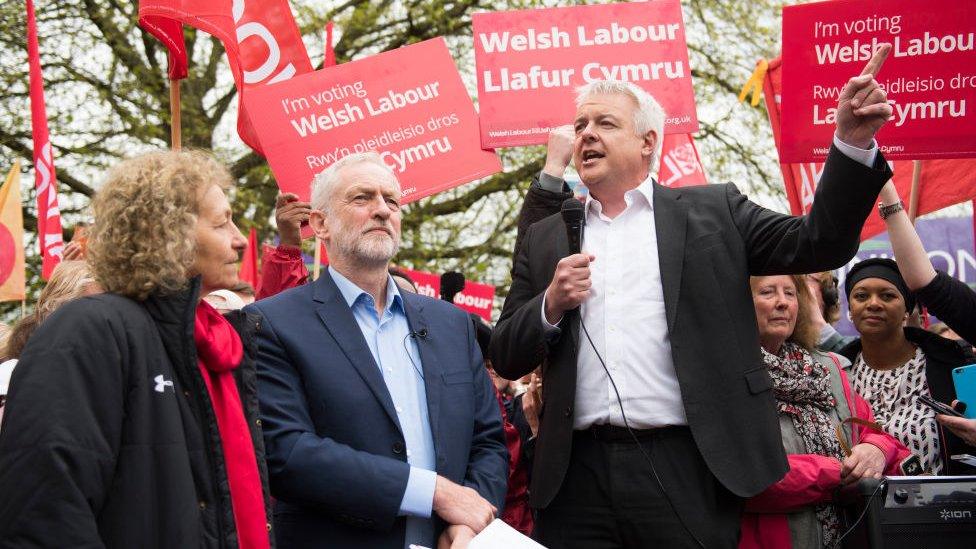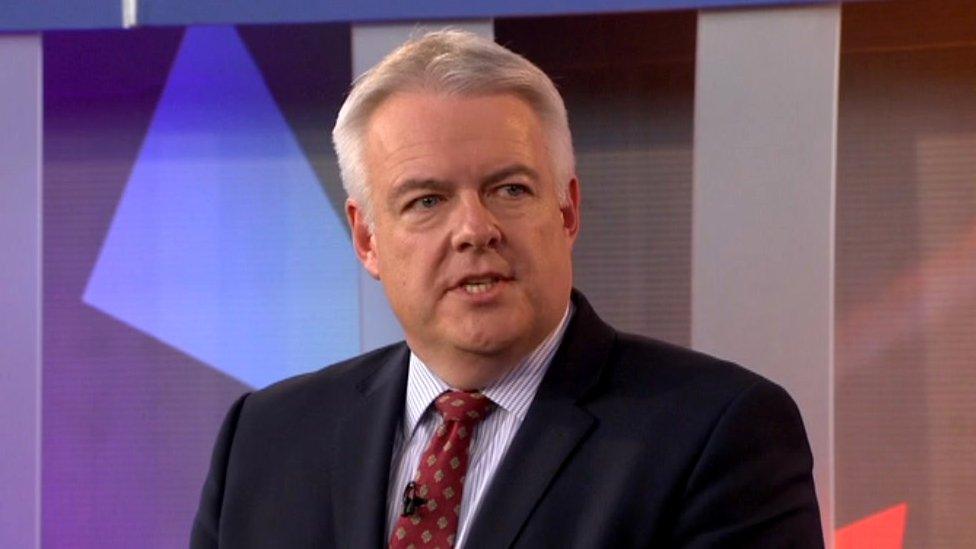General election 2017: Nye Davies view on Welsh Labour
- Published

Carwyn Jones (right) attended a rally with Jeremy Corbyn in April, but has otherwise kept his distance
Nye Davies of Cardiff University's Wales Governance Centre assesses the Welsh Labour campaign for the general election.
The upcoming election is going to be tough for the Labour Party. After a disappointing showing in 2015, it has failed to gain ground, external under leader Jeremy Corbyn and some in the party fear it could do even worse than it did last time out.
In Wales, a heartland for the party, Labour has come first in every general election since 1922. The first two Welsh polls, external since the election was called suggested that this dominance may well come to an end on 8 June.
The data suggested that Theresa May's attempts to make this the "Brexit election" have been succeeding and were likely to lead to a Conservative breakthrough in Wales.
However, the most recent Welsh Barometer poll, external has put Labour back in the lead in Wales, rising nine percentage points. Despite this indication of an increase in support, Labour cannot afford to be complacent in Wales.
In order to prevent a Tory breakthrough in Wales, there has been a clear effort by the Welsh Labour Party to distinguish itself from its comrades across the UK.
Launching Welsh Labour's election campaign, First Minister Carwyn Jones made no mention of Labour leader Jeremy Corbyn.
Welsh Labour announced five pledges which included devolved policy areas: housing, health and education. When the Labour Party manifesto was leaked, Welsh Labour distanced itself saying it was "not Welsh Labour's manifesto… Welsh Labour will be publishing its own distinct manifesto, building on the success of our five pledges for Wales".
It is a clear attempt to highlight differences between Welsh and UK Labour as Mr Jones tries to fight off a Tory charge for Welsh seats, including his own constituency in Bridgend.
These differences were further highlighted in a recent letter to voters from the first minister where he makes no mention of Mr Corbyn and focuses specifically on devolved issues. Releasing a Welsh Labour manifesto, external in itself is a clear continuation of Welsh Labour's tactic to differentiate itself from Jeremy Corbyn.
This distinction is nothing new from Welsh Labour. In 2002 former first minister Rhodri Morgan made his ''clear red water speech, external", outlining the different path that Labour was to take in Wales compared with the Labour Party at Westminster.
Indeed, calls for Welsh Labour to separate from UK Labour and operate on a more federal basis have gathered pace over the past few years. After a poor 2015 general election result, Carwyn Jones tweeted it was "time for change in the structure, external" of the Labour Party. When asked if a federal party was an option he replied that it was "one option".
Whether making the distinction between "Welsh" Labour and Jeremy Corbyn's Labour will prove effective of course remains to be seen.
Welsh Labour has arguably been successful in convincing voters that there is enough difference between it and the UK party.
Labour has remained in power in Wales since 1999 and despite a poor performance in the 2015 general election, it did fairly well in only losing one seat in the Welsh Assembly elections in 2016, albeit helped somewhat by the semi-proportional voting system operating in Wales, external.
Welsh Labour might well claim that it was this distinction that helped it perform better than expected in the recent local elections, external - Andy Burnham put his success in the recent Greater Manchester mayoral election, external down to focusing on local issues rather than a "Westminster approach".
The party will be hoping that focusing on issues close to home in Wales will help to fend off the Conservatives.
But deploying this tactic may cause confusion among voters who don't fully understand what powers are devolved, and which are not (and it seems the same can be said for the prime minister and Jeremy Corbyn also).
Convincing voters to vote for Labour in the general election based on devolved issues might confuse things even more.
Also, the lack of a distinct Welsh media, external might make this tactic even more difficult to implement. If people in Wales are getting their news from UK-wide sources, they will be reading and hearing about May vs Corbyn, not Carwyn vs May.
Carwyn Jones will hope to reframe the debate in Wales and break through the Corbyn-May narrative, but the lack of coverage for Welsh issues in the UK-wide media could prevent this from happening.
However, despite these hurdles, Labour in Wales has shown huge resilience in the face of poor performances at the UK-wide level.
The recent polling data suggests it might be able to continue this resilience. The historical pattern of voting in Wales has remained largely stable, exemplified by Labour's electoral dominance since 1922.
It perhaps comes down to an attitude best displayed by Labour hero Aneurin Bevan, who reportedly said in 1945 that it would be "an act of naked treachery to his country" for a Welshman to vote Conservative.
With the battle-lines being redrawn by Theresa May to reflect the Brexit divide, Welsh Labour will be determined to convince voters not to contemplate that most treacherous of acts.
- Published26 May 2017
